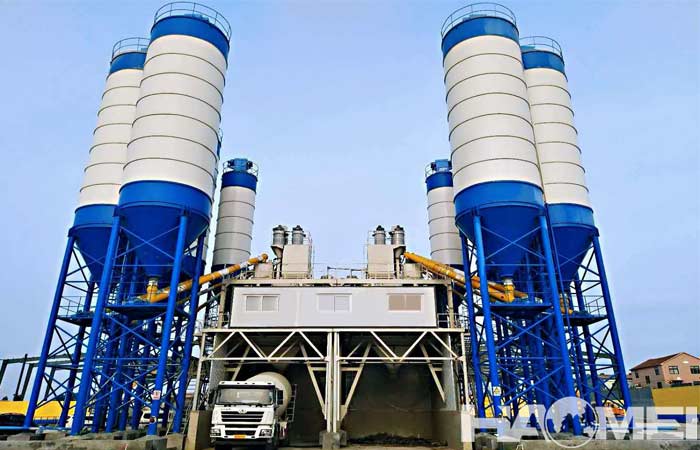Categories
- Case & News (50)
- Blog (565)
A central mix concrete plant, also known as a centralized concrete mixing plant or a commercial concrete mixing plant, is a facility used to produce concrete on a large scale. It usually consists of several parts, including an aggregate storage system, a conveying system, a mixer, a control system, and other auxiliary equipment. The main function of a central mix concrete batch plant is to mix cement, sand, gravel, water, and other admixtures into concrete in certain proportions and to ensure the quality and consistency of the concrete. This type of concrete mixing plant is usually located at a fixed location and delivers the mixed concrete to the construction site via trucks or other means of transportation.
The capacity of a central mix concrete plant usually varies depending on the size and equipment configuration, with small plants producing approximately 25 to 50 cubic meters per hour, medium-sized concrete plants up to 50 to 150 cubic meters, and large concrete plants exceeding 150 cubic meters, and is also affected by factors such as equipment maintenance, availability of raw materials, and operational efficiency.

Specifically, central mix concrete plants have the following characteristics:
– High degree of automation: modern central mix concrete plants are usually equipped with automatic control systems, which can accurately control the ratios of various materials and ensure stable quality of concrete.
– Efficient production: it can produce concrete quickly and in large quantities to meet the needs of large-scale engineering projects.
– Environmental protection measures: In order to minimize the impact on the environment, the central mix concrete batching plant usually adopts some environmental protection measures, such as dust control and waste water treatment.
– Quality control: Since all concrete is produced in the same place according to uniform standards, it is easier to ensure the consistency of concrete quality.
– Cost saving: For large projects, the use of a central mix concrete plant can reduce the cost of on-site mixing, including labor and equipment maintenance.
– Flexible distribution: The concrete produced can be delivered to each site in time by specialized transportation vehicles to meet the needs of different construction schedules.
– Multiple mixing ratio options: Concrete with different strength levels and performance requirements can be provided according to customer needs.
Central mix concrete plant is usually used in large-scale construction projects, such as bridges, roads, tunnels and high-rise buildings, because it can efficiently produce large quantities of high-quality concrete. A central mix concrete batch plant usually has the advantages of high automation, high production efficiency and stable concrete quality. In addition, it can adjust the proportion of concrete according to different project needs to meet specific construction requirements.